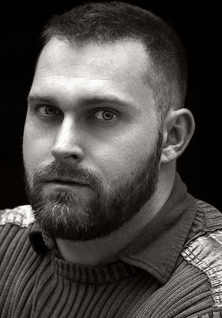 Name: Chris Peckover
Name: Chris Peckover
Age: 37
Birth Place: Montreal, Quebec
Sexuality: Girrrrrl
Notable films: Undocumented (2010), Better Watch Out (2016) [Read more…]
The curated portfolio of film journalist Joe Lipsett
by Joe Lipsett
 Name: Chris Peckover
Name: Chris Peckover
Age: 37
Birth Place: Montreal, Quebec
Sexuality: Girrrrrl
Notable films: Undocumented (2010), Better Watch Out (2016) [Read more…]
by Joe Lipsett
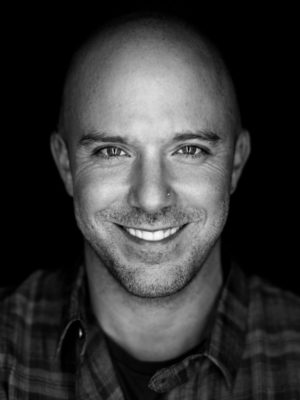 Name: Carter Smith
Name: Carter Smith
Age: 47
Birth Place: Bowdoinham, Maine
Sexuality: Gay
Notable films: Bugcrush (2006), The Ruins (2008), Jamie Marks Is Dead (2014) [Read more…]
by Joe Lipsett
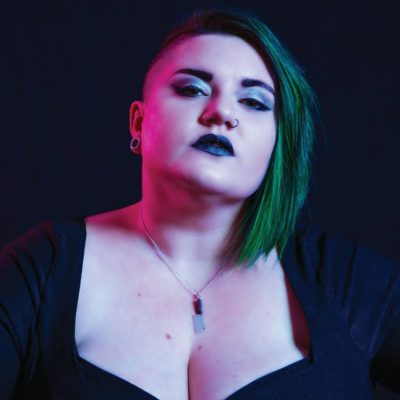 Name: BJ Colangelo
Name: BJ Colangelo
Age: 29
Birth Place: Winthrop Harbor, IL
Sexuality: Queer/Gay
Notable films: Margaret (2016), Powerbomb (2018), Deathcember (2019), Labrys (2019)
When did you know you were queer? When did you come out?
BJ Colangelo: The truth is that I knew when I was about five-years-old. I had fallen in love (the way only a kindergartener can) with a girl in my class. We kissed on the playground and when the teacher told our parents, she was sent away to Catholic School. (She IS gay, by the way; we reconnected in College)
However, I was raised in a community with very well known parents (my dad was a politician). We were always in the public eye and I was afraid that my sexuality was going to ruin my father’s career, so I desperately tried to convince myself that I wasn’t gay. I had relationships with women in private all throughout my life, but it wasn’t until my college years that I tip-toed out of the closet and just recently finally began to publicly live my truth. There is no wrong way for someone to come to terms with their sexuality.
In the last five or so years, you’ve really become a bit of a multi-hyphenate (writer, actor, director, producer). How did you get into filmmaking?
BJC: Filmmaking is something that I never knew that I had the option to pursue. As a woman, I was socially conditioned to believe that filmmaking wasn’t meant for someone like me. It wasn’t until I met my Powerbomb co-director, Zach Shildwachter, that someone finally told me, “there’s no reason you can’t make movies. Do it.”
I know you’ve branched out with Powerbomb most recently, but most of your filmmaking career is tied to horror. What is it about horror that keeps you coming back?
BJC: Horror has always been my lifeblood for as long as I can remember. I spent a decade analyzing and critiquing horror films, and it’s where my brain likes to live. Powerbomb is more of a character study/thriller, but there are elements of horror littered throughout. Fear is a universal emotion, but what makes us afraid is different for every person. I’m fascinated by figuring out what impacts us as a whole, and how can I bring that to screen.
What films (queer or not) have made a significant impact on you and your work? In what way?
BJC: I have worshipped at the altar of John Waters for as long as I can remember. His punk-rock/DIY/take no shit attitude in all of his films is awe-inspiring. Waters tells stories that he wants to tell, he tells them in his way, and never sacrifices his creativity or style in the process. He casts “non-traditional” actors and doesn’t give a single fuck what anyone thinks of him. If I can capture even a fraction of that energy, I’ll consider my career a success.
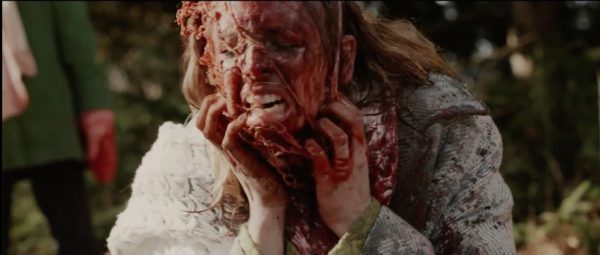
“They Used To Laugh and Call Him Names” from Deathcember
You’re working out of Cleveland, which is rare compared to a lot of other directors situated in Hollywood. Does that present its own challenges? How progressive or welcoming is the industry (Cleveland or more broadly speaking) for queer creators right now?
BJC: Working in Cleveland has its benefits because it is exponentially cheaper to work here than anywhere else. Cost of living is laughably affordable compared to places like New York or Los Angeles. Rental fees, props, locations, costumes, craft services, etc…all of these things can be done on a shoestring budget.
As far as the progressive/welcoming environment…it really depends. Ohio is still a swing state and still has a Republican controlled congress. There aren’t statewide protections for LGBTQ+ folk and although Cleveland is one of the progressive bubbles in the state…it’s still Ohio. Less than three months after shooting a queer horror short film at a bar where I work, we were harassed by a religious right extremist group in the parking lot. I’ve been fortunate to find a community of creatives that I can depend on and come from affirming belief systems, and I refuse to let them go.
Several of your shorts have strong feminist and socially progressive themes. Do you believe that your sexuality informs your films?
BJC: It absolutely informs my films. I’ve spent a lifetime watching films where I didn’t feel seen or they were told from a perspective that I’ve never experienced. The films I make are the stories I wish I had access to when I was younger.
Do you subscribe to queer readings of your films?
BJC: Absolutely. All of my films have queer themes, even the ones that aren’t overtly queer.
Have you interacted with many queer horror fans of your films? What has that experience been like?
BJC: I have! It’s always exciting to listen to people try and draw metaphors from my work to their own lived experiences. The greatest compliment, however, is when a queer actor gets to play a queer character and thanks me for allowing them to play a character they actually identify with. That always makes me feel good.
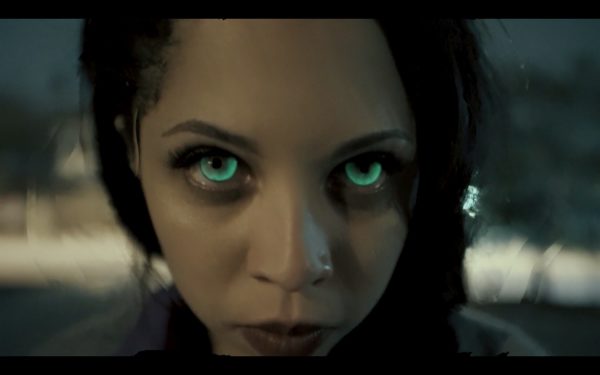
Labrys
You’re a very busy woman – you’re contributing a segment to the holiday anthology Deathcember and you’re shopping a mysterious queer horror short to festivals. What can you tell me about these projects?
BJC: I first and foremost have to thank Chelsea Stardust (All That We Destroy, Satanic Panic) for recommending Zach and I to the producers of Deathcember. We’re the only Midwest contributors of the American-based directors, and we shot our segment outdoors in 21-degree weather during an Ohio winter. Without giving away the plot, the title is “They Used To Laugh and Call Him Names.” I think that does a pretty good job at giving audiences an idea of what topic we’re tackling.
As far as my horror short, it’s called Labrys and it’s about a woman on her first date with another woman, and her journey to come to terms with who…and what she is. It was shot on a shoe-string budget, but I’m extremely proud of it. It’s Carrie meets X-Men on a lesbian first date.
Follow BJ on social media:
by Joe Lipsett
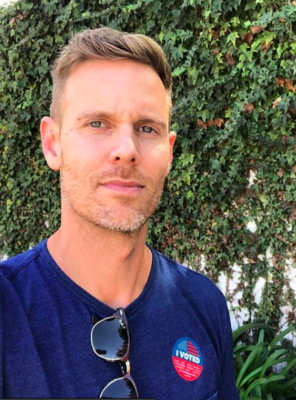 Name: Christopher Landon
Name: Christopher Landon
Age: 44
Birth Place: Los Angeles, CA
Sexuality: Gay
Notable films: Paranormal Activity: The Marked Ones (2014), Scout’s Guide to the Apocalypse (2015), Happy Death Day 2U (2017), Happy Death Day 2U (2019)
When did you know you were queer? When did you come out?
Christopher Landon: I knew I was different from an early age. Like a lot of queer little boys, I loved my sister’s Barbie dolls, I loved movies like Mommie Dearest and Big Business. I had boy-crushes in high school but I dismissed them as “a phase.” I finally came out when I was 22 after meeting my first boyfriend. I didn’t want to lead a double-life so I just did a big-ass coming out tour and told everyone in my orbit within about a week’s time. LOL.
How did you get into filmmaking?
CL: I have always been obsessed with movies. Especially horror. I made short films as a kid and studied film in college. I took an internship at Disney when I was about 18 and that’s where I really began to see a path to becoming a filmmaker.
Why do you make horror films?
CL: Horror has always been a genre that intrigues me. It’s so versatile. You can Trojan-horse so many themes and ideas in a horror movie. I love the genre’s renegade status no matter how mainstream it seems to be now. It’s still punk rock and dangerous.
What films (queer or not) have made a significant impact on you and your work? In what way?
CL: If I had to choose two filmmakers that have influenced me the most I would say John Carpenter and John Hughes. They’re totally different Johns but each made an equal and profound impact on my childhood and my creative sensibilities. Carpenter is the master of suspense. I have seen The Thing and Halloween a million times and they never stop educating me. John Hughes captured something so few filmmakers ever can – the pain and awkwardness of adolescence. But even in a movie like Trains, Planes, and Automobiles he could make you laugh and cry – often within seconds of each other. I love the quirk and heart he brought to his work.
You’ve worked on two high profile projects with Blumhouse (the Happy Death Day films). What is it like to helm a franchise for a major studio? How progressive or welcoming is the industry for queer creators right now?
CL: I’ve been in this business for a minute now and I would say we’re living in a good moment as far as change and diversity go. My sexuality hasn’t played too great a role in my work, in terms of being marginalized, but I have always strived to bring a queer perspective to my movies. That’s not to say I haven’t encountered resistance in the past, but I think people in general are just looking for good stories no matter where (or who) they come from.
That said, we still need more diversity. When I was growing up, I didn’t see people like me in movies unless they were the brunt of a joke. That’s changing, but it can change a lot more.
Do you believe that your sexuality informs your films? If yes, in what way? If no, is that a conscious decision?
CL: OH FUCK YES. Hahahahaha. I mean, I made a studio zombie movie with a Britney sing-along and a horror set-piece while Dolly Parton’s 9-5 blared. My shit is G-A-Y. But I also think growing up queer and feeling like I didn’t quite belong really reinforced a strong sense of empathy in me. My characters are often misunderstood and stand a little outside of the world around them.
When Trace Thurman and I covered Happy Death Day for the Horror Queers podcast, we found a really sweet story about a gay fan thanking you for including the character of Tim because it normalized gay people. Have you interacted with many other queer horror fans of your films? What has that experience been like?
CL: Absolutely. I love interacting with queer horror fans. There are SO many of us out there. I feel a kinship to them. It’s so important to be seen.
With Happy Death Day 2U now out on VOD and Blu, what’s next for you?
CL: I have a really fun movie I’m about to go shoot. I can’t say what it is yet, but it has the best gay character ever. He is out, proud and fucking badass. I can’t wait to make this one.
Follow Christopher on social media:
by Joe Lipsett
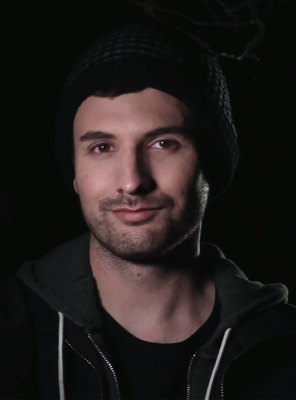
Name: Parker Brennon
Age: 26
Birth Place: Gahanna, OH
Sexuality: Gay
Notable films: Haunt Me (2017), Elise’s Nightmare (2017), Below the Trees (2018)
When did you know you were queer? When did you come out?
Parker Brennon: In elementary school, I started hanging out with girls instead of boys. These opposite-sex friendships prompted some boys to call me a fag, long before I had an understanding of my own sexuality. Around age 11, I realized I was gay, and it was extremely difficult to accept. I didn’t want to be the thing I was accused of being. Finally at age 15, I told my sister I was bisexual. It wasn’t true, but it was easier than saying “gay.” I found an online boyfriend living in New York and eventually told my mom about him. She was very kind and hugged me while I cried. That was a turning point. I started coming out to my friends and being more open.
How did you get into filmmaking?
PB: My best friend, my siblings, and I started a series of terrible shorts back in 2007. We would basically pick a noun and add “Can Kill.” Camp Can Kill. Looks Can Kill. Musicals Can Kill. The movie’s title determined its plot. I did all the video recording and editing, and it was ridiculous fun. I wouldn’t willingly share those movies with anyone today, but that’s how I began.
Why do you make horror films?
PB: Every genre has films I enjoy, but to write and direct something myself, I need some ardent energy. Horror is what best fuels my fire. I love an eerie atmosphere. I love a sense of adventure. I love seeing women on screen who are compelling villains or survivors overcoming terrifying obstacles. Stories that contain these elements are easily born in the horror genre.
What films (queer or not) have made a significant impact on you and your work? In what way?
PB: Carnival of Souls (1962) is my number one. I adore Candace Hilligoss’ bizarre performance. Her cold, detached character is so fascinating and weirdly relatable. Best of all, she’s plunged into an eerie, supernatural story. It’s not at all a “perfect” film, but that’s part of its charm. I also love Silent Hill (2006), largely because the video games hold an extremely special place in my heart. The nightmarish world is an ideal horror sandbox and evokes wonderfully dark adventures.
How progressive or welcoming is the industry for queer creators right now?
PB: It’s much better than it was in the past. Although, I spend more time thinking about inequality on screen. I recently watched The Town That Dreaded Sundown (2014). I liked it, but I couldn’t help noticing that three hetero couples have sex scenes, and a gay couple is murdered before doing anything. It was a reminder that American culture relishes seeing sexual straight people, but “gay stuff” (especially between men) is always a sore subject. I can almost hear Aunt Sassy shouting “I don’t need to see that!”
Do you believe that your sexuality informs your films? If yes, in what way? If no, is that a conscious decision?
PB: Yes, my sexuality hugely impacts my work. I’ve never written a scene with heterosexual sex or kissing. My life contains an interminable amount of these displays, and if I’m in charge of a story, I’ll leave that out every time. So far, the films I’ve directed have a mix of sexually ambiguous and straight characters, but I’ll include more obviously queer people in my future work.
Do you subscribe to queer readings of your films?
PB: Hell yes! Haunt Me has more gay energy than my other shorts, but I hesitate to recommend it because my directorial skills were weaker then. Although, it was lucky enough to get over 120,000 views on YouTube, so I guess things worked out for that one.
Have you interacted with many queer horror fans of your films? What has that experience been like?
PB: Mostly online, but yes! I love it when queer people write encouraging comments or connect with me on Twitter. It’s great to be part of that community. On Twitter and Letterboxd, I often interact with queer horror fans who would otherwise be absent from my day-to-day life.
You’ve been putting out horror shorts with some regularity over the last few years. Do you plan to make the leap into horror features in the future?
PB: Absolutely. After Winter’s Blood is finished, my next project will be a feature. I wrote a feature-length version of Below the Trees, but it requires more financing than I can provide alone. Rather than dwell on that roadblock, I decided to come up with a lower budget idea. In January, I visited LA and met with a writer/producer I love. I pitched the low budget idea to her, and she’s excited about it. We’re developing that screenplay this year, and hopefully, it’ll end up being my feature directorial debut.
Follow Parker on social media: